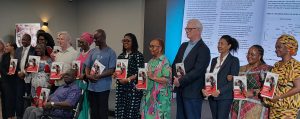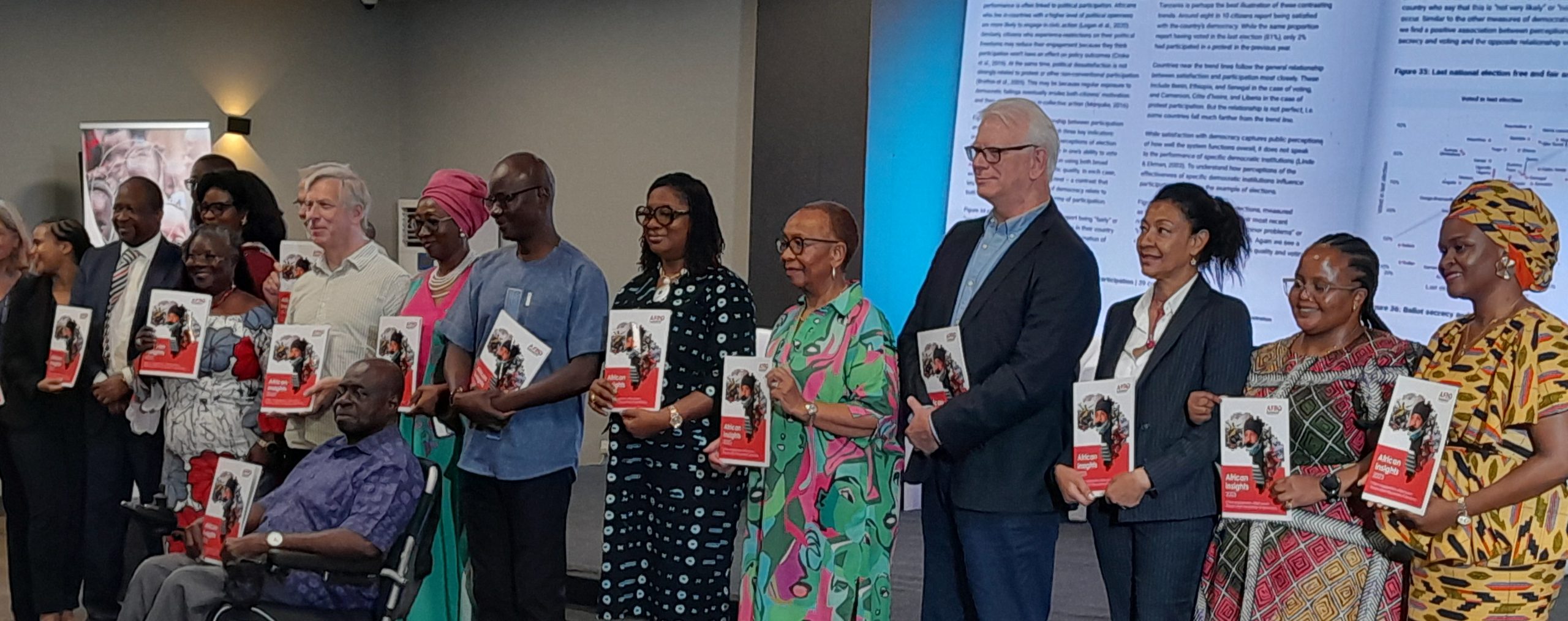
Accra, Ghana//-Afrobarometer, Africa’s leading survey research organisation, today unveiled its 2025 Flagship Report on Citizen Engagement with interesting findings.
The report, being the second edition, focused on key indicators such as: Voting, political party affiliation, political discussion, attending community meetings, joining with others to raise an issue, contacting leaders, and protesting in Africa.
Key findings
Electoral participation
Presenting the key findings of the report by Afrobarometer’s Senior Analyst/Methodologist, Madam Rorisang Lekalake, said election environments vary considerably across the African continent.
“On the positive side, across 39 countries, a resounding 85% of Afrobarometer’s responders report that they feel free to vote as they choose.
A narrower margin of 59% say the last national election in their country was mostly or completely free and fair, though one in three (34%) say it had major problems or was not free and fair, including majorities in Congo Brazzaville, Guinea, Morocco, and Sudan an overwhelming 72% in Gabon”, she added.
Madam Lekalake, however, acknowledged that even if elections are generally free and fair, a lack of public confidence in election efficacy may undercut people’s motivation to vote.
“When we asked how effective elections are in ensuring that legislators reflect the views of voters, a slim majority (51%) say they are not effective. While only 41% say they are”.
Similarly, by a 50%-to-45% margin, citizens say they are not confident that elections effectively enable voters to remove leaders from office if they are not doing what the people want.
Still, for the most part, Africans claim to take advantage of this foundational opportunity to engage. Excluding those who were too young to vote, nearly three-quarters (72%) say they voted in their country’s last national election preceding the Afrobarometer Round 9 survey, including an impressive nine out of 10 in Liberia (89%), Sierra Leone (90%), and Seychelles (91%), according to the newly launched report title-‘African Insights 2025: Citizen Engagement, Citizen Power: Africans Claim The Promise Of Democracy’.
While research has shown that self-reported turnout numbers may be inflated (Karp&Brockington, 2005) due to “social desirability” as citizens want to appear to be “doing their part”, these numbers are at minimum indicative of the importance that people place on this opportunity to make their voices heard.
However, according to the findings of the report, there are exceptions. Only about four in 10 report voting in Sudan (42%), Côte d’Ivoire (41%), and Cameroon (41%).
Another measure of electoral engagement is affiliation with a political party. Although association with a political party does not reflect any specific action on the part of citizens, at its simplest partisan identification serves as a valuable indication of political interest and a signal of preferences, and may be a precursor to other forms of electoral engagement such as voting, attending rallies, and working on campaigns, as well as contacting political leaders (Matters & Kronke 2020).
As the report indicated, across 38 countries where this question was asked in Round 9, 41% say they “feel close to” a political party. Sierra Leoneans are the most engaged, with nearly three-quarters (73%) reporting a party affiliation, and at least half say the same in 10 other countries.
However, in Mauritius (18%), Burkina Faso (18%), Sudan (11%), and Tunisia (7%), fewer than one in five identify with a party.
Collective action
Collective action is one of the 10 ways Africans get involved in citizen engagement. As Bratton 1998) posited, voting may be a cornerstone of democracy, but it is an imperfect tool for expressing citizen voice.
Elections, the report said are generally occur only once every few years, and they force voters to compress myriad needs, preferences, and evaluations into just a few choices. How do citizens engage their leaders, make demands on them, and hold them accountable between elections?
Non-electoral forms of citizen engagement can take a variety of forms. Here the senior analyst and methodologist at Afrobarometer focused on several collective forms of engagement, starting with the simple act of discussing politics with friends and families.
While not as common as voting, discussions about politics are a common pastime for many Africans.
On average, more than six in 10 say they discuss politics occasionally (44%) or frequently (18%). Nigeriens are the most outspoken (76% at least occasionally), followed by Senegalese (74%), Nigerians (74%), and Cameroonians (73%).
In contrast, citizens are more reticent about engaging in political conversations in Angola (48%), Mozambique (47%), and Cote D’Ivoire (44%).
If we just focus in on those who say they discuss politics frequently, Kenyans emerge as the most politically engaged (32%), along with Malians (31%), and Basotho (29%), according to the findings of the report.
Another form of collective engagement as examined by the report that is potentially-although not always-politically is attendance at community meetings. Community meetings may take place in many forms and for many reasons.
Communities may have regularly scheduled meetings that members are expected or required to attend government officials may call a community meeting to share information about a new policy or project; or a group of concerned neighbours may call a meeting to present a collective demand to local authorities such as for improved garbage collection or water supply.
Participation in community meetings may be voluntary, mobilised, or even coerced. The likelihood of attendance may also be shaped by local cultural practices, such as the regular community gatherings known as pitsos in Lesotho, kgotlas in
Botswana, or barazas in the Swahili-influenced cultures of East Africa that serve the broad purposes of sharing information, discussing community problems, or resolving conflict. This ambiguity appears to be reflected in the particularly wide variation across countries on this indicator.
On average, 47% say they attended a community meeting at least once in the past year, but this ranges from a high of 85% among Malagasy (including 52% who did so frequently) and 79% among Tanzanians (45% frequently) to fewer than one in five in Seychelles (13%) and Tunisia (11%).
Those who attend community meetings may do so as activists or merely to listen, but Afrobarometer also asks about a more reliably active form of collective engagement: joining with others “to raise an issue.”
On average, 42% say they engaged in this way during the previous year, including 20% “several times” and 11% “often”.
Malawians lead the way by a sizeable margin – 42% say they made collective demands frequently, and 77% did so at least once. At least half of citizens took this step in 10 countries, while just one in four did so in Mozambique (26%), Tunisia (24%), and Botswana (22%).
Contacting leaders
We now turn to a more individualised approach to civic and political participation: directly contacting leaders. People may approach their leaders for many reasons, including to request assistance with personal or community problems; look for jobs, donations, or other favours; or resolve conflicts.
Afrobarometer focuses on political contact, asking respondents whether they contacted leaders “about some important problem or to give them your views.”
Contacting is a relatively common practice, though how common depends on which leaders we ask about. More than one in three respondents (37%) say they contacted a traditional leader in the past year, led by Lesotho (61%) and Sierra Leone (60%); half or more contacted a traditional leader in seven countries.
Elected leaders may be somewhat less present in the community, but even so, 28% of citizens contacted a local government councillor and 15% a member of Parliament (MP), while 20% contacted a political party official.
In 11 countries, at least one in three citizens contacted a local government councillor, led by Zimbabwe (42%), South
Africa (39%), and Niger (39%). Liberians did not have local councillors at the time of the Round 9 survey, but MPs seem to be available to fill the void, as 41% of Liberians contacted an MP, far surpassing the level in any other country.
Even so, more than one-quarter contacted an MP in Mauritania (29%), Congo-Brazzaville (26%), and Seychelles (26%).
Across 29 countries where respondents were asked about contacts with all four types of leaders, an impressive 51% report contact with at least one, and 7% had contact with all four (not shown).
Contact rates were highest in Lesotho (68% contact with at least one), Sierra Leone (68%), Ethiopia (61%), and Niger (60%). A remarkable 20% had contact with all four types of leaders in Mauritania.
Protesting
Finally, we consider the most contentious form of political engagement measured by Afrobarometer: protest (Tilly & Tarrow, 2015).There is perhaps no more assertive way of making one’s needs or opinions known than taking to the streets.
(The survey question does not capture the nature of the protest, e.g. whether it is non-violent or violent, state-sanctioned or not.) While protests often seem like exceptional events, they have occurred quite frequently across the continent and globally.

Just since 2024, major demonstrations have erupted in Senegal in response to President Macky Sall’s attempted self-coup (Noyes & Sall, 2024), in Kenya to protest corruption and the government’s Finance Bill (Opalo, 2024), in Mozambique to condemn suspected election fraud (Human Rights Watch, 2024), in Uganda to resist a planned oil pipeline (International Federation for Human Rights, 2024), in Ghana to protest government inaction on illegal mining (galamsey) (Reuters, 2024), in the Central African Republic to object to inadequate health care (Koena, 2025), and in Guinea to protest the junta’s failure to launch a return to democracy (Associated Press, 2025).
Protesters often risk heavy-handed or even deadly responses from their governments, and they don’t always succeed, but there can be little question that they have frequently changed the course of national or even continental politics.
Given the risks, it is not surprising that protests are the least common mode of political engagement: About one in 10 respondents (9%) say they participated in a protest or demonstration during the previous year.
Nonetheless, Afrobarometer’s researchers find that a remarkable one in four Ethiopians (25%) joined a protest, along with 20% of Malians and Sudanese (the Sudan survey was conducted in December 2022, after prodemocracy protests that started in September 2019 and just months before the onset of the current crisis and civil war). Tanzanians, in contrast, are the least inclined to protest: Just 2% took to the streets in the previous year.


